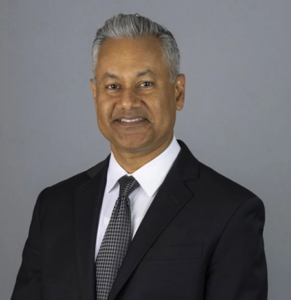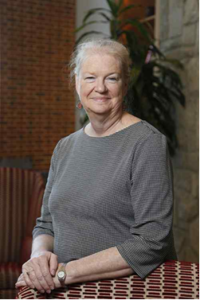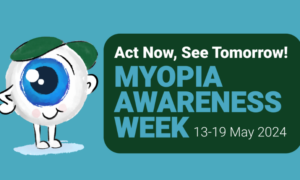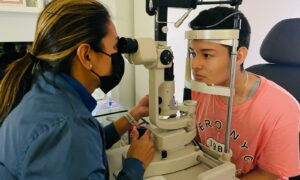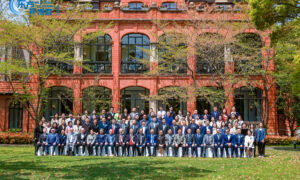sponsored content
October 27, 2022
Vyluma aims to preserve the vision of a global population by providing meaningful and effective pharmaceutical ophthalmic solutions for refractive disorders.
Recently, Dwight Akerman, OD, MBA, FAAO, FBCLA, FIACLE, Chief Medical Editor of Review of Myopia Management, interviewed Vyluma executives Navneet Puri, PhD, Founder, Chairman, and Chief Executive Officer; Raul Trillo, MD, MBA, Chief Commercial Officer; and Karla Zadnik, OD, PhD, Principal Investigator, to learn about the design, results, and implications of the Phase III Childhood Atropine for Myopia Progression (CHAMP) study.
Dwight Akerman, OD, MBA, FAAO, FBCLA, FIACLE: Why did Vyluma choose to study topical low-dose atropine, specifically its proprietary formulation NVK002, as an intervention for juvenile-onset myopia?
Navneet Puri, PhD: Myopia is a growing global epidemic that can have profound consequences for the vision of millions of children, yet there are limited FDA-approved treatment options. Vision correction with single vision contact lenses and eyeglasses does not treat myopia progression, leaving children at risk of serious visual consequences later in life. There is a clear and growing unmet need for new therapeutic approaches for children with myopia.
Low-dose atropine has been shown to be effective in slowing myopia progression in children in large randomized clinical trials in Asia. However, there has been a lack of studies in populations outside of Asia. Furthermore, many questions remain related to the natural progression of myopia, the safety and efficacy of long-term treatment with low-dose atropine, and other issues. The pivotal Phase III CHAMP (Childhood Atropine for Myopia Progression) clinical study is the first time that low-dose atropine has been studied extensively in a large U.S. and European population in a well-controlled manner.
The CHAMP study was designed, in collaboration with the FDA, to evaluate whether our proprietary, investigational, low-dose, preservative-free atropine eye drop, NVK002, is safe and effective as a treatment for the progression of myopia in children. If approved by the FDA, NVK002 would be the first-in-class, clinically proven, pharmaceutical treatment for myopia progression in children.
Dr. Akerman: What are the objectives of the CHAMP study, Vyluma’s pivotal Phase III clinical trial for NVK002?
Raul Trillo, MD, MBA: The pivotal Phase III CHAMP clinical study has been designed to evaluate whether Vyluma’s proprietary eye drop formulation of low-dose atropine, NVK002, is safe and effective as a treatment for the progression of myopia in children. The CHAMP study is the first time that low-dose atropine has been studied extensively over many years in a large cohort of myopic children in the U.S. and Europe.
Dr. Akerman: Please describe the design of the CHAMP study.
Karla Zadnik, OD, PhD: After developing the novel, preservative-free formulation of low-dose atropine, NVK002, Vyluma worked with the FDA and other regulatory authorities globally to design the CHAMP study to evaluate whether investigational NVK002 eye drops are safe and effective as a treatment for the progression of myopia in children. It is a large, three-arm, randomized, double-masked, placebo-controlled, Phase III clinical study conducted across the U.S. and Europe in children and adolescents ages 3 to 17. The study consists of two stages: a three-year study to evaluate the safety and efficacy of NVK002, after which enrolled patients are re-randomized for a masked, one-year study period to characterize the potential for rebound after cessation of therapy.
We will be evaluating multiple efficacy endpoints, including the ability to slow the advancement of myopia as measured by Spherical Equivalent Refraction (SER) and axial length, as well as conducting an extensive safety evaluation.
The CHAMP clinical study follows groundbreaking studies conducted in Asia, which concluded that low doses of atropine could be used to slow the progression of myopia in children.
Dr. Akerman: Please explain the high-level results of the CHAMP study.
Dr. Zadnik: With more than three years of nightly dosing with NVK002 0.01%, the CHAMP study demonstrated that this dose has an excellent safety and tolerability profile with fewer adverse events than 0.02% or placebo, with no discontinuations of 0.01% treated patients due to adverse events. Moreover, with respect to efficacy of NVK002, the 0.01% dose produced statistically significant and clinically meaningful differences from placebo in every key measure, including a responder analysis of the proportion of subjects progressing less than 0.50D of myopia over three years (as measured by SER), the mean change from baseline in SER, and mean change from baseline in axial length. The CHAMP study findings are consistent with other randomized low-dose atropine trials in other populations.
Dr. Akerman: Is there supporting evidence for the use of low-dose atropine in childhood myopia?
Dr. Trillo: Low-dose atropine has been studied in multiple clinical studies globally to slow the progression of myopia in children, and the results have been very encouraging.
Vyluma’s CHAMP study will be the first to provide results from a large, rigorous, placebo-controlled, multi-center, international study. Based on the currently available evidence, multiple U.S. and international clinician organizations recommend low-dose atropine in myopia management, including the American Academy of Ophthalmology, the American Optometric Association, and the International Myopia Institute. Unfortunately, at this time, no low-dose atropine pharmaceutical eye drop product is approved by the FDA for this use.
Other emerging treatment options include eyeglasses, orthokeratology, and multifocal contact lenses for pediatric myopia. These alone may not meet the needs of all patients requiring treatment for slowing myopia progression. Emerging evidence continues to suggest the benefits of low-dose atropine used in conjunction with other treatments for myopia, such as multifocal contact lenses, orthokeratology, and eyeglasses. The combined use of treatments for myopia has not been approved by the FDA.
NVK002 is a proprietary, investigational, low-dose, preservative-free atropine eye drop administered nightly designed to treat the progression of myopia in children. It leverages the benefits of a well-known compound in a low-dose, preservative-free formulation that may help address the urgent need for pharmacological control of myopia. If approved by FDA, NVK002 would be the first-in-class, clinically proven, pharmaceutical treatment for myopia progression in children.
Dr. Akerman: What are the challenges of compounded atropine? Describe the importance of an FDA-approved formulation.
Dr. Puri: As previously mentioned, atropine in solution is an inherently unstable molecule. This is especially problematic when making atropine at incredibly low concentrations, such as 0.01%. Although higher concentrations, such as 1%, are available commercially today in the U.S., there are technical challenges related to the formulation of ophthalmic atropine at low doses to ensure the consistency, potency, sterility, and integrity of the product for use in children. It is challenging to ensure that the concentration listed on the bottle is the same as the one administered to the child over the entire treatment period. This can lead to variability in response to treatment and inconsistent results when prescribing compounded low-dose atropine.
The choice of additives, buffering agents, and preservatives can affect a medication’s safety, tolerability, and efficacy. In ophthalmic products, low pH can lead to poor adherence due to patient eye discomfort. Viscosity plays a vital role in ensuring sufficient residence time of the drug on the corneal surface. Shelf life is critical to reducing waste and for a product that must be shipped or stored under refrigeration. Many compounding pharmacies may be poorly equipped to formulate high-quality, low-dose atropine consistently. Often, they do not have the resources, and some may not adhere to the same quality standards as those used in pharmaceutical manufacturing.
For this reason, compounded ophthalmic formulations may have an inconsistent shelf life, dosing, efficacy, and eye comfort, leading to a negative patient experience and potential treatment failure. Benzalkonium chloride (BAK) is an antiseptic detergent frequently used as a preservative in topical ophthalmic medicines to prevent microbial contamination. Preservative-free formulations of low-dose atropine can avoid the toxicities and side effects associated with prolonged exposure to BAK and other preservatives, which include dry eye and chronic corneal irritation conditions. Parents and eye doctors expect and deserve consistently high-quality, low-dose atropine for the chronic treatment of myopia in their children.
Dr. Akerman: What is next for NVK002 in the FDA approval pathway?
Dr. Trillo: We are assembling the many documents required by the FDA for our New Drug Application (NDA) and plan to submit the NDA for NVK002 in the coming months. If approved by FDA, NVK002 would be the first-in-class, clinically proven, pharmaceutical treatment for myopia progression in children.
Dr. Akerman: What commercial partnerships has Vyluma established to date? Does Vyluma expect to establish additional commercial partnerships in the future?
Dr. Puri: Vyluma is developing pharmaceutical treatments to address unmet ophthalmic needs globally. This commitment has been highlighted through our partnerships for NVK002 with Laboratories Théa and Zhaoke Ophthalmology. Théa, the leading independent European pharmaceutical group in ophthalmology, will be responsible for the commercialization of NVK002 in Europe, and for the registration and commercialization in Canada, Mexico, and selected South American countries. Zhaoke Ophthalmology, a leading ophthalmic pharmaceutical company in Asia, will be responsible for the clinical development and commercialization of NVK002 in Greater China, South Korea, and certain select countries in Southeast Asia (including Brunei, Burma, Cambodia, Timor-Leste, Indonesia, Laos, Malaysia, the Philippines, Singapore, Thailand, and Vietnam). These are dedicated and successful pharmaceutical eye care companies excited to partner with Vyluma to support the development of NVK002.
Dr. Akerman: Thank you, Drs. Puri, Trillo, and Zadnik, for sharing your insights into the CHAMP study and the implications for eye care professionals and myopic children.
Click here to watch Dr. Akerman interview Dr. Puri and Dr. Trillo about the CHAMP study.


